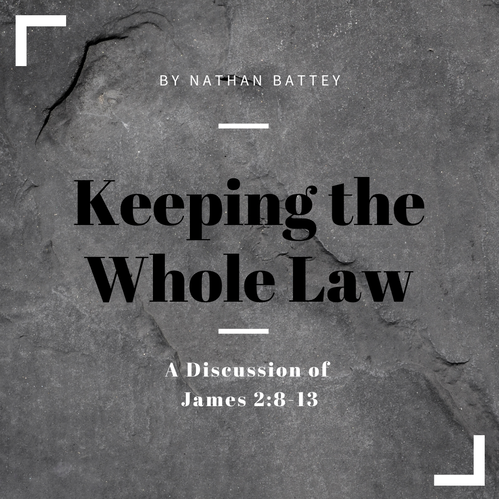| Keeping the Whole Law: James 2:8-13.pdf |
|
The following article contains sermon notes centered around a discussion of James 2:8-13. The notes were compiled by Nathan Battey and are not copyrighted. We simply ask that the material not be altered or quoted out of context.
0 Comments
Everyone loves logic until their position is found to be illogical. Those who cry out against logic do so because they cannot employ logic as the means to the end they seek. When logic is abandoned, he who cries loudest rules the day.
When God created the heavens and the earth He did so through the power of His Word. When God created man, He chose in his infinite wisdom to make man in His image and according to His likeness (Gen. 1:26). When God chose to communicate with man he at first spoke directly to Adam, then generally to mankind through the prophets (Heb. 1:1), and finally through His Son. Though God at times spoke directly, and at other times through messengers, He always used words to do it. The word of God is, “…living and powerful, and sharper than any two-edged sword, piercing even to the division of soul and spirit, and of joints and marrow, and is a discerner of the thoughts and intents of the heart.” (Hebrews 4:12) God expressed His full will and revelation in words, inscribed them in a book, and then preserved them so that all mankind can hear Him speak the same message. (Jude 3) Yet His Word is often neglected and maligned most forcefully by those who claim to believe its message. As a result, faithlessness abounds (Rom. 10:17) One cannot have faith without the Word of God. In order to know God we must first begin with a belief in truth. If there is no truth, there is no God for not only does God claim to be the expression of truth (John 14:6) but it would be impossible to know Him without truth. Truth exists and everyone believes in some form of truth however logically or illogically their belief is formed. Even people who claim truth does not exist cannot help but advocate for truth as they assert their prized truth that there is no truth. Not only does truth exist, truth also necessitates both words and logic. Though some truths can be experienced without words, truth finds its fullness in logical expression. Illogical truth and truthless logic are oxymorons. When logic loses truth it is no longer logical and when truth loses logic it is no longer truth. When logic is applied to Scripture man has undertaken a noble endeavor to use their God-given mind for God’s glory. Noble as it may be, many are the slain who lie fallen in error on the field of logic. As a result, many decry logic rather than error. The greatest malefactor of logic according to the illogical is the Law of Necessary Inference. Though the illogical deny the Law of Necessary Inference exists, logic touts it, revels in it, and demands it. Consider the following illogical statements: “When human reasoning is involved, men always err.” No doubt the one who makes such a claim has erred for they are condemned by their own words. Such a conclusion, though false, can only be reached through (poor) human reasoning. Again, many claim, “Only what is expressly stated in the Bible can be understood.” Oh yeah? And where is this truth expressly taught in the Bible? A claim based on inference and logic should not be allowed to deny the use of logic and inference. Again, “Only the doctrines God has expressly stated in the Bible must be considered grounds of fellowship!” And where is this doctrine expressly stated in the Bible? Have such advocates not made a binding doctrine for the church that has been achieved through means of (non-necessary) inference? All three of the afore-mentioned arguments cry out against the use of logic, yet all must attempt an appeal to logic in order to have their case heard. “There is no way we can agree in matters of inference!” is itself an inference that pleads for agreement in an inference. If we can and must agree on this inference, why must we give up hope of agreeing in other matters of inference? Simply stated, every statement of Scripture, every example, and every precept cannot be understood without the Law of Necessary Inference. To deny the Law of Necessary Inference is to deny both the comprehension and application of Scripture. Or, to state it another way, if we cannot infer what God has implied, His words are meaningless and a failure. Consider the implications of the most basic truths held by all professing Christians: “Jesus is the Son of God.” This statement implies there are at least two distinct members of the Godhead, that God is the Father, that the Son became incarnate, and that the sonship of Christ continues to this very moment. All of the inferences just made are necessary, not because I have made them, but because God implied them when He stated, “You are My Son, today I have begotten you.” (Acts 13:33) “God loves me.” The love of God is understood through inferences drawn from His words and His actions. Nowhere in Scripture will you find your name, yet God expects you to draw the necessary inference that He loves you. God’s provision implies His loving Fatherhood (Matthew 6:26). His general statements of love imply His love for the individual (John 3:16). The clear statement that “God is love” (1 John 4:8) has far reaching implications that all of humanity must necessarily infer. “God is light and in Him is no darkness at all.” (1 John 1:5) These words necessarily imply that God is pure goodness and is not the author of evil, John Piper not withstanding. It also necessarily implies that God cannot dwell with sin. We must understand that God used light and darkness as metaphors in this passage. When light appears it destroys darkness and such is the result when God interacts with evil. The passage further implies that God will conquer evil as light conquers darkness. Though a rather clear passage, necessary inferences abound. Every truth carries necessary implications because God is the author of truth and He has placed necessary implications within truth. Men must infer what God has implied and to deny man’s possibility to do so is to imply that God is incapable of communicating a message to man in an indirect method. Man’s failure to grasp the mind of God is the result of either man’s ignorance or rejection of logic. God is a rational being who created rational creatures in His image and expects them to think rationally when He communicates to them through His Word. May we use the ears to hear our God when He speaks and our minds to understand what He has spoken. For those interested in pursuing the use of logic in understanding God’s Word for God’s glory, I would recommend the following books: Hermeneutics by D. R. Dungan How Implication Binds and Silence Forbids by George F. Beals Love Your God With All Your Mind by J. P. Moreland Tactics by Greg Koukle |
Categories
All
Nathan Battey
is an evangelist of the Church of Christ in Arlington, Texas. Archives
January 2024
|



 RSS Feed
RSS Feed
